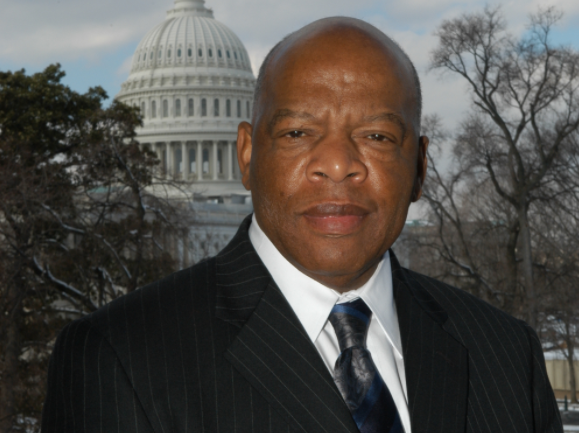

Dear ASALH Members and Friends,
When the sad news came that John Lewis had succumbed to pancreatic cancer, I found the words, “John Lewis is dead,” hard to say and even harder to accept. The Association for the Study of African American Life and History deeply mourns his loss—a loss not only to those of us who knew and loved him, but a loss to all of America. John Lewis stood out as a living testimony to American ideals—to our declaration of self-evident truths and to our allegiance to a historic, even fought-for indivisible nation with liberty and justice for all. In the person of John Lewis, such ideals represented neither lofty abstractions for boasting and philosophizing, nor legal doctrines vulnerable to disrespect and evisceration; but rather they represented calls to action to make the United States put democracy’s meaning into daily practice instead of confining it to revered documents and eloquent speeches.
From boyhood to adulthood, his commitment to racial equality and social justice grew ever stronger, nurtured by his knowledge of African American History and the religious and ethical teachings he learned in church. John Lewis stated in his speech at the opening of the National Museum of African American History and Culture in Washington, DC, in September 2016: “When I was a little child growing up in rural Alabama, a short walk to the cotton fields, but hundreds of miles from the Washington Monument or the Lincoln Memorial, my teachers would tell us to cut out photographs of great African Americans for Carter G. Woodson’s Negro History Week, now called African American History Month.” A man filled with pride in his racial heritage, John Lewis early on recognized the many ways that African Americans had contributed to this nation, and he knew the rights guaranteed to them by the Constitution’s Thirteenth, Fourteenth, and Fifteenth Amendments.
A man of tremendous courage, John Lewis stood up to injustice in countless life-threatening situations in the 1960s through acts of non-violent protest against racial discrimination. He was jailed, bloodied, and brutally beaten numerous times—indeed far more times than the televised, horrific scene called “Bloody Sunday” in March 1965,” when he and others attempted a voting-rights march across the Edmund Pettus Bridge in Selma, Alabama. At the time, he did not shirk from speaking truth to power. Lewis questioned why the president of the United States had not sent troops to Selma, since he was sending troops to Vietnam. A week later, on March 15, 1965 and after the failed attempt of Martin Luther King, Jr., and even more protesters to succeed with the march, President Lyndon Johnson stated on national television: “Their cause must be our cause too. Because it is not just Negroes, but really it is all of us, who must overcome the crippling legacy of bigotry and injustice. And we shall overcome.” John Lewis’s actions on the Edmund Pettus Bridge contributed to the passage of the Voting Rights Act of 1965. Thus, John Lewis taught us to transcend tragedy in vigilant efforts that would eventually prove triumphant. His own life was proof of this. A man once denied the right to vote because of his race, John Lewis was elected in 1986 to serve in the United States House of Representatives, where he remained until his death.
A man filled with great faith in God, John Lewis exhibited a never-waning fortitude in the struggle for equality, and that struggle inspired his abounding love for all. He would speak of the “dignity and worth of every human being ,” and it was especially this quality about him that endeared John Lewis to people of many different backgrounds. In his life’s journey from sharecropper to civil rights activist to member of the United States Congress, his dedication to humanity knew no limits. As a congressman, he spoke out for African Americans, Native Americans, women, the LGBTQ community, the disabled, immigrants, and the poor. In his last public statement, John Lewis gave words of support to the present Black Lives Matter movement. He never doubted that each generation must fight for social justice and thereby engage in “good trouble,” as he called his own activism.
In my mind’s eye, I imagine John Lewis near the end, thinking about his life and the glory that is to come in a world that knows no racism, no social injustice, or such sorrow. Perhaps, before he said goodbye, he felt the urge to sing his own version of a well-known song in the black church tradition. I imagine it might have gone something like this: “I’m on the battlefield for my Lord and our rights. Yes, I’m on the battlefield. And I promised Him that I would serve His Justice till I die. I’m on the battlefield for my Lord.”
John Lewis lived up to that promise every day of his life. Rest in peace, dear friend.
Sincerely,
|
|

